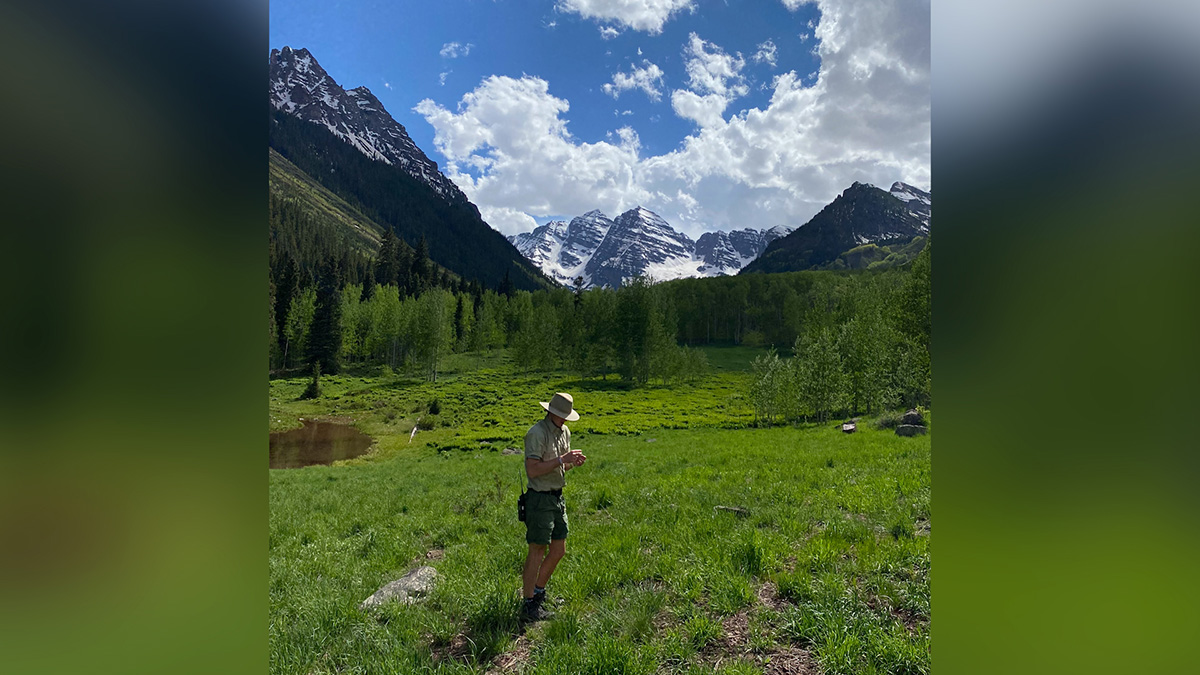
For episode 32, senior Eli Thurston shares his experience taking new outdoor recreation and park management (ORPM) courses and interning with the U.S. Forest Service at Maroon Bells Scenic Area in White River National Forest near Aspen, Colo. Eli is majoring in forestry with a concentration in wildland recreation, which is changing to an outdoor recreation and park management concentration.
Recently, you’ve been taking these courses with Dr. Ryan Sharp. We are now changing the concentration to outdoor recreation and park management. How have you liked those classes so far?
I’ve loved those classes. Ever since I’ve been taking those classes with him, they’ve just kind of hit home with me. Previously, before he got here, I was kind of just taking the entry level forestry classes having to do with like timber stand management and stuff, like cruising timber and stuff like that. That stuff is interesting to me, but I was more interested in the national park space and then also kind of the entrepreneurship route in between outdoor recreation concentration. For me, I kind of think of it as like outfitting, kind of guiding, stuff like that. That really interested me in that setting.
When did you decide that’s what you wanted to get into?
Honestly, I think when Dr. Sharp got here, my first semester with him, I had the “Intro to Wildland Recreation,” or Outdoor Recreation, I think it was, and we really homed in on that from like the first couple weeks in that park management setting, national park management setting, state parks, etc. I think that really got the ball rolling in my mind cause the more we talked about it and looked into what does it look like, and he obviously has a ton of experience in those types of jobs, and he would give good insight into class. I kind of was thinking along those lines before he got here, but just his experience and his stories that he would tell during class really kind of set that up for me.
He told me this summer you interned with the U.S. Forest Service in Colorado and those courses helped a lot with your internship and the skills you needed.
Definitely. That class I was just talking about, “Intro to Wildland Recreation,” helped a lot, but also I think it’s “Planning and Management” class. Every Tuesday we’d go around kind of like on a field trip type setting out in the field, and we talked to people in these parks and understand their job and outlook and what they do on the daily basis. That kind of got the ball rolling for me and looking for internships along those lines, and I’ve been going out to Colorado on road trips since I was a kid so I’ve always kind of wanted to go back out there and kind of get a taste of living there for a summer at least or a couple months. That was cool, but we kind of home in on those classes about balancing and managing between the natural resource itself and the human side, the human interactions. It’s hard. I wouldn’t say it’s impossible, but it’s hard to get that kind of balance where you want it between the two, and that’s something we homed in on especially in the “Planning and Management” course. That really helped as well as just like educating visitors and talking to visitors and kind of helping them understand why we need to try to find that balance between the natural resource and humans.
Do you have any goals or plans for after you graduate?
I was really looking into going back. I worked at Aspen, Colorado at the Maroon Bells National Scenic Area. It was a cool space out there near Aspen, Colorado, and they actually offered me back next summer. I’m hoping to try to talk to them this winter to extend that not into the summer but as a full-time job. I think what I did was under the outdoor recreation crew. There’s a bunch of crews within their program. There’s wilderness crew, outdoor rec crew, develop crew. There’s a bunch of crews. I think along those lines I would like to set that as a goal, and it doesn’t have to be in that area. It could be anywhere else, state park, national park, somewhere along those lines, but what I did this summer was cool and just having those interactions with people really kind of sparked my love even more for what I was doing. I told him I’m really kind of an introvert, but I can also have these conversations with people. Going into the job, I knew it was going to be kind of communication-heavy, and I was kind of iffy on it cause I don’t love it. I’m not standoffish, but I don’t love it. Then this summer, I kind of grew in that aspect where I loved the area where I was in, but what I loved even more was just having those interactions with visitors and educating them and walking them through stuff like why we can’t approach a moose or why we can’t get close to black bears and stuff like that cause some people genuinely just don’t know and that’s what we’re there for. It was cool to have those interactions.
What would you say to a freshman student who is interested in outdoor recreation and park management?
I would just say, I would just say kind of get on the ball early. Just kind of look at these jobs. I think mine was on the Texas A&M job board. It may have been on USA Jobs, somewhere like those, but kind of get in the, get the ball rolling early. I kind of messed that up my first couple years here cause I was kind of indecisive on what I wanted to do, and I felt like maybe I didn’t want to do an internship for a summer and stuff like that, but I’m really glad I did, and there’s a lot of open space with the park service, the forest service, even BLM Bureau of Land Management. There’s a lot of job opportunities so just kind of keep your eyes open, listen to Dr. Sharp if you have Dr. Sharp. Talk to him. He knows. He has a lot of connections in that space, and we’re hoping to kind of make a connection here with where I worked as well so just be ready. Just keep your eyes open for opportunities and be willing to take a chance, take a risk.
When you say internships, do you think seasonal work would benefit students too?
Exactly. Mine was regarded as an internship this summer, but there were also a ton of seasonal workers who were interacting with us and actually living in the same space as us. I think those seasonal jobs, especially if we’re talking about more on the west coast and Colorado, Montana, Wyoming, those seasonal jobs are cool. I’ll just give an example. There were some seasonal wilderness crew people who weren’t out of school so it wasn’t an internship for them. They were seasonal, and then through that, they have it set up to where they can become part of the forest service ski patrol teams in the winter because it starts snowing out there like now. They transition from that seasonal summer job of wilderness crew, and then they’re in back country, ski country helping people. It’s cool. Seasonal work is cool.
Is there anything else you would like to add just about the concentration or your experience in general?
I think the concentration is kind of broad which helps me a lot, and I think it should help a lot of undergrads or freshmen, sophomores, juniors coming up through school to keep those opportunities open. I think there’s a lot of different pathways that this can get you. Like I was talking about previously: park service, forest service, land management service, stuff like that, but then there’s also the chance and opportunity that you can create your own rafting business or create your own guide business in the woods. At the end of the day, I would just say take those risks. Take those chances. Get your feet wet and see what you like and don’t like. I know it’s kind of cliche and a lot of people say that, but it really is helpful, and it’s really true.
You can find information about the ORPM concentration here.
